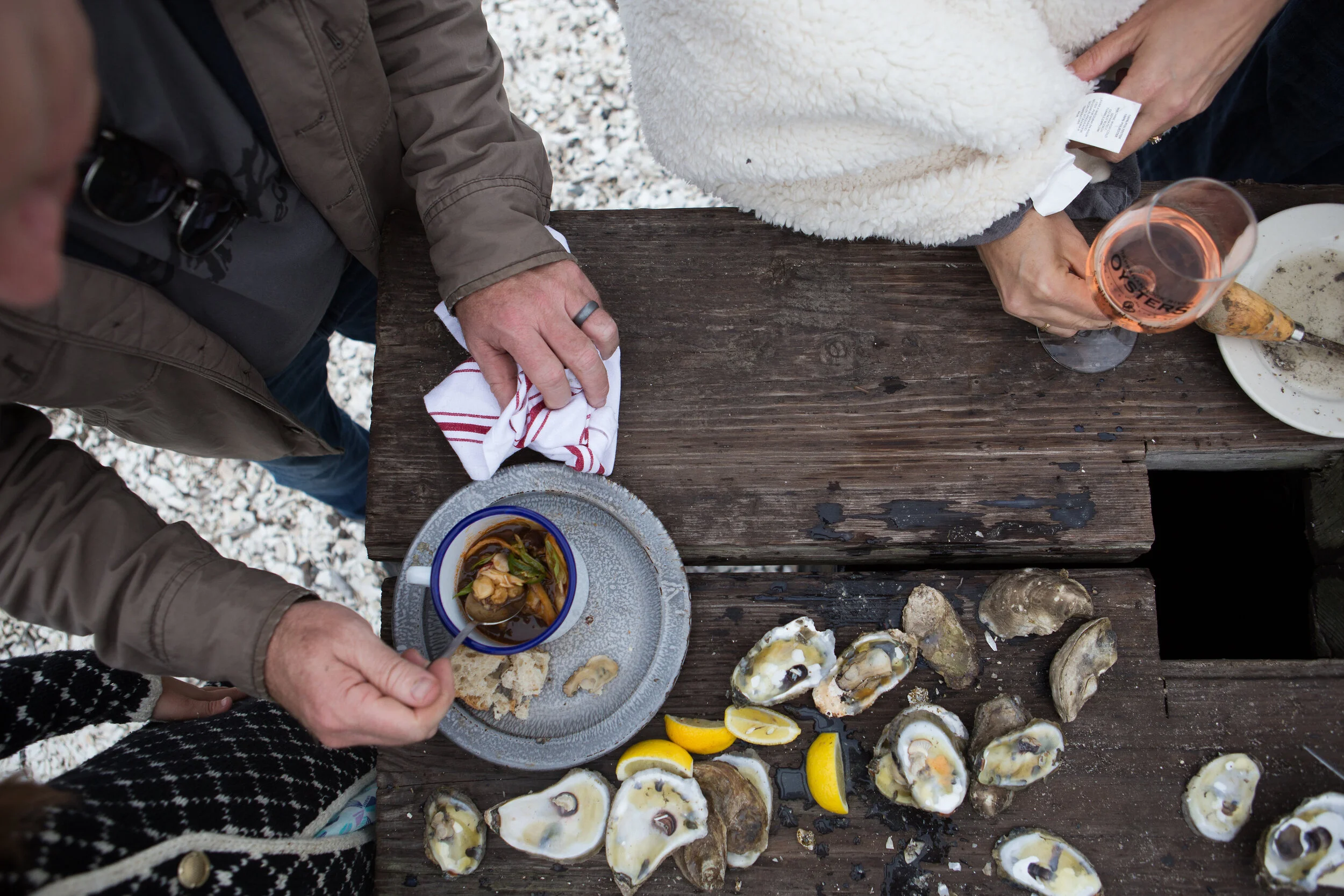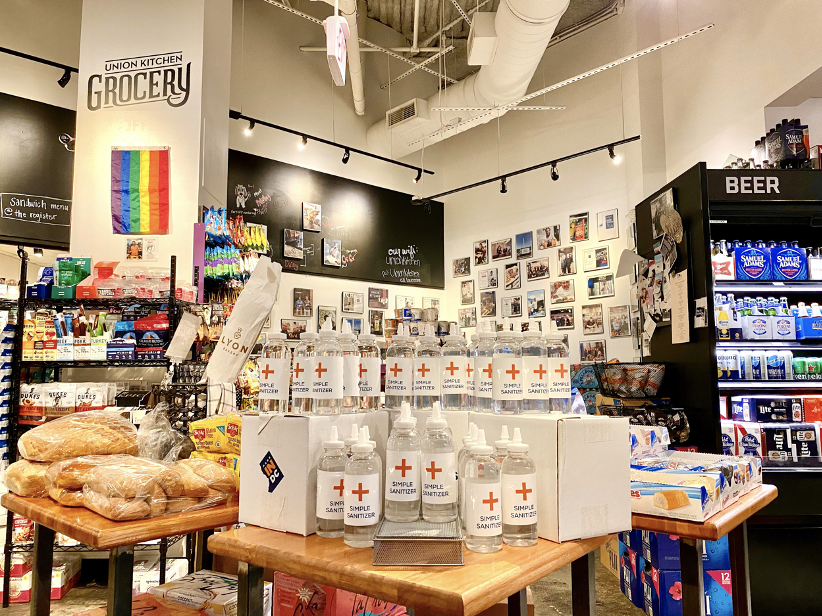The Big Pivot: How Compass Coffee Mobilized to Produce Simple Sanitizer in the Wake of COVID-19
/Simple Sanitizer ready for sale at Union Kitchen Grocery.
How a veteran-owned local roaster produced sanitizer to help stem pandemic and increase their Covid-hit revenues
Walking into a convenience store on March 11th, 2020 was a disconcerting experience. Numerous empty shelves. Cleaning products nowhere to be found. Hand sanitizer sold out. It was an early warning sign of just how serious the pandemic was about to become. As people across the country began to shelter-in-place, as cities emptied out and offices, stores, and restaurants began to close, Compass Coffee, a D.C.-based coffee roaster, scrambled to save its business.
Compass Coffee founders Michael Haft and Harrison Suarez in front of the roastery.
Founded in 2014 by Michael Haft and Harrison Suarez, two Marines returning from Afghanistan, Compass Coffee lists “Always Find a Way” as one of its core values. In just a few short years, the upstart coffee company grew to twelve locations throughout D.C. and northern Virginia, and it earned widespread critical and popular acclaim.
But today, amidst a global pandemic, Compass faces its greatest challenge yet.
“Harrison and I are pretty uniquely suited for dealing with this kind of environment,” says Haft. “As strange as it sounds, the chaos and uncertainty of a Marine Corps deployment is very similar to the volatile situation we're in. Every day is different. Things you thought were one way have quickly changed. Fortunately, we're pretty adaptable in these types of situations.”
With downtown D.C. nearly empty—some estimates put office occupancy in the single digits—Compass Coffee found itself without customers in its cafés.
“Within a matter of weeks, we went from thinking about coffee, tea, and pastries, to tracking a shipment on a cargo tanker of isopropyl alcohol and figuring out how we’d even begin to price a product we’d never made before.”
Compass Coffee’s Kuran Malhotra
“It was eerie,” says Kuran Malhotra, Director of Corporate Development at Compass Coffee. “One day, I was sitting in our Georgetown café chatting with a few regulars, and the next, we had the tables and chairs stacked, along with signs reminding people to stay six feet apart.”
Unable to seat customers, Compass switched its focus to online ordering, beverage delivery, and, of all things, hand sanitizer.
“Three months ago, making hand sanitizer would have never crossed my mind,” Malhotra says when asked if he ever expected the situation COVID forced upon Compass. “It’s crazy how things have changed. But I think we’re doing a good job of meeting people’s needs, and giving back to the community that has given so much to us.”
Why hand sanitizer? Well, for Compass, amongst other D.C. businesses, one of the first lifelines in the pandemic was DC Mayor Muriel Bowser’s request for proposals for thousands of gallons of hand sanitizer to provide for first responders.
Compass quickly got to work.
The team responsible for the production of Simple Sanitizer at Compass Coffee.
“Mayor Bowser inspired us to make Simple Sanitizer,” says Malhotra. “The DC government was our first customer, and was the catalyst for this entire product line, which has helped so many individuals, first responders, and other small businesses.”
“The first step was figuring out what the different hurdles were, and breaking them down to divide and conquer,” Malhotra says. “Chas [Newman] onboarded new vendors, sourced ingredients, and derived and tested formulas. We had to work with the FDA and CDC standards, make drug labels, and ensure that we were putting out the best possible product. Michael [Haft] reconfigured the bottling line itself, and made sure that we could fit the assortment of bottles we were able to find. I worked on building out all our costs and inventory, designing the systems we needed to plan production, and creating product and pricing information for our customers.”
At the time, the Compass team was bottling its line of Simple Syrups in a dedicated kitchen space at Union Kitchen, a food accelerator based in D.C’s Ivy City neighborhood. With two large tanks and lots of steel pipes, Compass was brewing everything from vanilla and chocolate syrup that flavor their lattes and mochas, to a signature Cherry Blossom syrup that goes in their Cherry Blossom cold brew.
“The syrup brewing facility was always a fun place to be,” says Malhotra, “It was something we bootstrapped together, and basically overnight, we were able to switch from mixing pallets of sugar and chocolate powder to isopropyl alcohol and glycerine. This was all on the same line, with the same bottling equipment. It’s crazy how it just worked.”
Chas Newman, Compass Production Manager, took charge of sourcing ingredients, putting together a production plan, and reconfiguring the facility. By the end of that first week, he had already begun the process of importing ingredients from as far as South Korea.
“Building the supply chain was hard,” says Newman. “In March, nobody could commit to having anything or getting anything to D.C. It wasn’t clear if freight companies would be operating, and we weren’t sure what we’d be able to get and when.”
Simple Sanitizer Bottles waiting to be boxed after production.
At the time, the demand for hand sanitizer and other cleaning materials was off the charts. The key ingredients, like isopropyl alcohol and aloe, were scarce. The lead time for plastic bottles went from days to months.
“We couldn’t source a proper pump top bottle,” says Haft. “Pumps were like gold. There was literally nowhere you could buy a pump top, so at first we had regular squeeze bottles and little squeeze bottle caps.”
The Compass team worked around the clock to build a new supply chain and to source the necessary ingredients: isopropyl alcohol, hydrogen peroxide, and glycerol.
“Within a matter of weeks, we went from thinking about coffee, tea, and pastries, to tracking a shipment on a cargo tanker of isopropyl alcohol and figuring out how we’d even begin to price a product we’d never made before,” Malhotra says. “It was challenging, exciting, and incredibly fulfilling to know that what we were doing was having a direct impact on people around D.C., in a time of need and stress.”
“One of our core values is Build Your City. We have a great team, and we were just quick and willing to solve the problem. Everyone was really flexible, and so when people started seeing this shortage, we put our heads together and figured it out.”
Since then, demand for Simple Sanitizer has been so strong that Compass shifted production to its new Ivy City roasting facility. “The Ivy City syrup room is incredible,” says Haft. “It’s three times the size, fully automated, and has been instrumental in meeting the overwhelming demand for sanitizer.”
Over the last six months of production, Compass has bottled thousands of gallons of Simple Sanitizer and helped everyone from first responders to small businesses in a time of need.
“We’ve completely had to change our plans,” Malhotra notes. “We’ve really had to modify the way that we think about what we do and we’ve had to reimagine the role that we play in the community.”
This post was sponsored by Compass Coffee.









